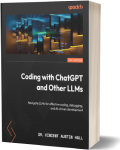Coding with ChatGPT and Other LLMs
Artificial Intelligence
Book Details
Book Title
Coding with ChatGPT and Other LLMs
Author
Dr. Vincent Austin Hall
Publisher
Packt Publishing
Publication Date
2024
ISBN
9781805125051
Number of Pages
326
Language
English
Format
File Size
7.1MB
Subject
AI-assisted programming
Table of Contents
- Coding with ChatGPT and Other LLMs
- Contributors
- About the author
- About the reviewers
- Preface
- Part 1: Introduction to LLMs and Their Applications
- Chapter 1: What is ChatGPT and What are LLMs?
- Introduction to LLMs
- Origins of LLMs
- Early LLMs
- Exploring modern LLMs
- How Transformers work
- A note on the mathematics of LLMs
- Applications of LLMs
- Summary
- Bibliography
- Chapter 2: Unleashing the Power of LLMs for Coding: A Paradigm Shift
- Technical requirements
- Unveiling the advantages of coding with LLMs
- Planning your LLM-powered coding
- Getting into LLM-powered coding
- Making it work for you
- Summary
- Chapter 3: Code Refactoring, Debugging, and Optimization: A Practical Guide
- Technical requirements
- Dealing with error codes – debugging
- Refactoring code
- Documenting code
- Testing code
- Virtual software companies
- Summary
- Part 2: Be Wary of the Dark Side of LLM-Powered Coding
- Chapter 4: Demystifying Generated Code for Readability
- Technical requirements
- Generating more readable code
- What makes code hard or easy to read?
- Summarizing code for understanding
- Generating documentation
- Summary
- Bibliography
- Chapter 5: Addressing Bias and Ethical Concerns in LLM-Generated Code
- Technical requirements
- Understanding bias in LLM-generated code
- Examining ethical dilemmas – challenges in LLM-enhanced working
- Detecting bias – tools and strategies
- Preventing biased code – coding with ethical considerations
- Summary
- Bibliography
- Chapter 6: Navigating the Legal Landscape of LLM-Generated Code
- Technical requirements
- Unraveling copyright and intellectual property considerations
- Addressing liability and responsibility for LLM-generated code
- Examining legal frameworks governing the use of LLMs in coding
- Possible future of the regulation of AI-generated code
- Summary
- Bibliography
- Chapter 7: Security Considerations and Measures
- Technical requirements
- Understanding the security risks of LLMs
- Implementing security measures for LLM-powered coding
- Making the future more secure
- Summary
- Bibliography
- Part 3: Explainability, Shareability, and the Future of LLM-Powered Coding
- Chapter 8: Limitations of Coding with LLMs
- Technical requirements
- Inherent limitations of LLMs
- Challenges in integrating LLMs into coding workflows
- Future research directions to address limitations
- Summary
- Bibliography
- Chapter 9: Cultivating Collaboration in LLM-Enhanced Coding
- Technical requirements
- Why share LLM-generated code?
- Best practices for code sharing
- Knowledge management – capturing and sharing expertise
- Making the best use of collaborative platforms
- Summary
- Bibliography
- Chapter 10: Expanding the LLM Toolkit for Coders: Beyond LLMs
- Technical requirements
- Code completion and generation tools
- SCA and code review tools
- Testing and debugging tools
- Summary
- Bibliography
- Part 4: Maximizing Your Potential with LLMs: Beyond the Basics
- Chapter 11: Helping Others and Maximizing Your Career with LLMs
- Why Mentor Others in LLM-powered coding?
- Other Ways to Share Your Expertise and Work
- Attend, Build, Network
- New Approaches from LLMs
- Summary
- Bibliography
- Chapter 12: The Future of LLMs in Software Development
- Technical requirements
- Emerging trends in LLM technologies
- Future impacts
- Coming challenges and opportunities
- Summary
- Bibliography
- Index
- Other Books You May Enjoy
